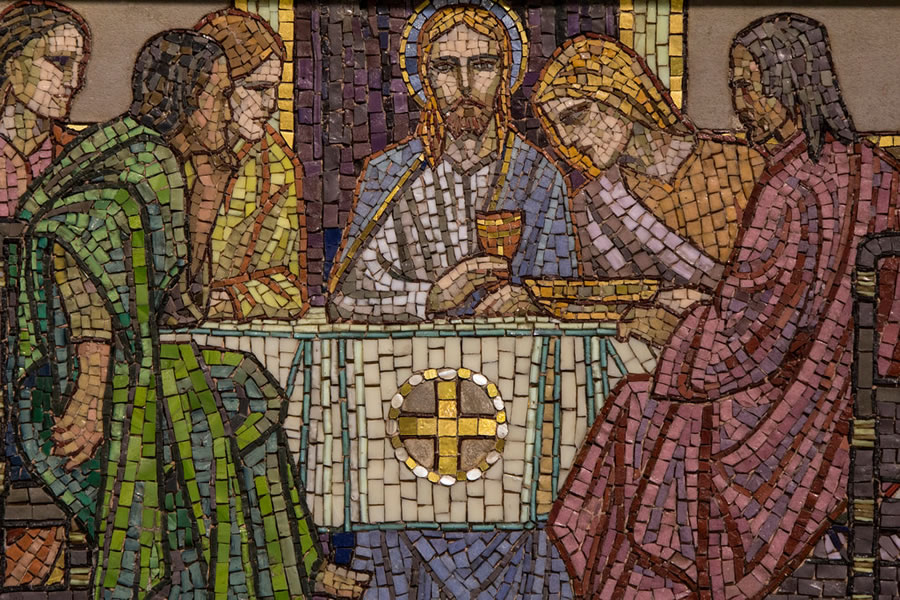
Jesus is the Bread of Life
06-06-2021Weekly ReflectionFr. Anthony Okolo, C.S.SpThe feast of the Most Holy Body and Blood of Christ called the Corpus Christi was introduced into the Church’s calendar in 1264 following the vision of an Augustinian nun Juliana of Liège.
According to the Council Fathers of Vatican II, “The Eucharist is the source and summit of our Spiritual Life as Catholics”, because in the Eucharist we affirm and proclaim that Christ is fully present in a unique form in the Bread and Wine after the words of the consecration. Which means after the words of the consecration the bread is no longer ordinary bread but the Body of Christ and the wine is no longer ordinary wine but the Blood of Christ. This means that Christ is fully present in the Eucharist. Eucharist is beyond times. According to Cardinal Bo, “The Eucharist unites us with the past, the Maundy Thursday’s enactment of Jesus who called us to “do it in memory of me” (Luke 22:19) and promise of the future “He who eats my flesh and drinks my blood has eternal life”. (Jn. 6:54) “Eucharist unites the present with the past and a glorious future of hope”.
Therefore, when we celebrate this feast it affords us the opportunity to give God collective thanks for Christ’s abiding presence with us which is made visible in the Eucharist. It is also an opportunity for us to seek a better understanding of the sacrament of the Body and Blood of Christ and to order our attitude to it accordingly, since the Eucharist is a sacrament of life which, if misused, could bring about the opposite effect. As St Paul wrote to the Corinthians, “All who eat and drink in an unworthy manner, without discerning the Lord’s body eat and drink judgment against themselves. For this reason many of you are weak and ill, and some have died” (1 Corinthians 11:29-30).
From the reading we find that there are two main reasons Jesus gave us this sacrament. (1) Jesus promised to be with us until the end of time (Matthew 28:20). In the Eucharist He provides a visible sign and an effective means of Him being present to us and us being present to Him. As Jesus Himself said, “Those who eat My flesh and drink My blood abide in Me, and I in them.” (2) Jesus said that He came that we may have life and have it to the full (John 10:10). In the Eucharist He provides a visible means of communicating this life to us so that we can be fully alive both in this world and in the next. As Jesus said, “Very truly, I tell you, unless you eat the flesh of the Son of Man and drink His blood, you have no life in you. Those who eat my flesh and drink my blood have eternal life, and I will raise them up on the last day” (John 6:53-54).
Thus, to be able to enjoy all these favors mentioned above we need to approach the Eucharist with a lively faith that Jesus is present in the Eucharist. If we approach the Eucharist with a materialistic mentality we fail to understand and so lose the benefits of such a wonderful gift of God’s love. The Eucharist is true food and drink, but at the same time it is very different from every other food and drink. The great difference lies in these words of Christ which St Augustine heard in prayer, “You will not change me into yourself as you would food of your flesh; but you will be changed into Me.” We transform ordinary food into our own bodies, but the food of the Eucharist transforms us into the body of Christ. Ludwig Feuerbach's statement that we become what we eat is never more true than in the Eucharistic experience.
Why then do many of us who receive the Eucharist not experience more of this radical transformation? Maybe this story will throw more light on the question. A team of Russians and Americans were on a common expedition. Among their cabin foodstuff was Russian black bread. It was tasty, but hard on the teeth. It happened during a meal that an American bit into a piece and snapped a tooth. He threw the bread overboard and growled: “Lousy Communist bread.” The Russian countered: “Is not lousy communist bread, is rotten capitalist tooth.” If we do not experience the transforming power of the Eucharist it is probably not on account of a lousy Eucharist, but on account of our rotten faith. Let us today approach the Eucharist with a more lively faith in the real presence of Jesus in the Eucharist and we shall experience therein God's saving power and transforming love.
Happy Feast of the Corpus Christi and May this Sacrament transform our lives and Families.
Fr. Tony Okolo
BACK TO LIST